Ex-Official: Rouhani’s Election Disqualification Politically Motivated
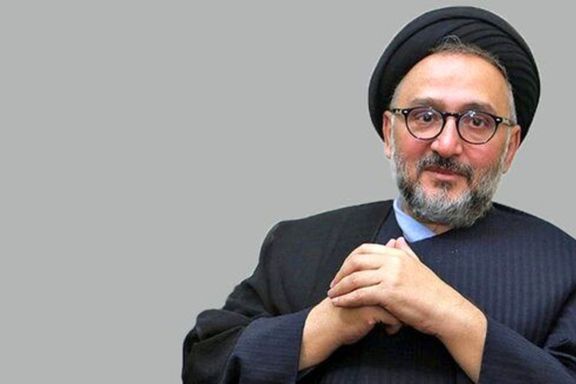
A reformist politician has said the decision to bar former president Hassan Rouhani from running for re-election at the Assembly of Experts was politically motivated.

A reformist politician has said the decision to bar former president Hassan Rouhani from running for re-election at the Assembly of Experts was politically motivated.
The decision to disqualify Rouhani was the result of a coordinated attempt, said Mohammad Ali Abtahi, a senior aide to former president Mohammad Khatami, in an interview with ILNA news website in Tehran on Saturday.
Abtahi hailed the former president as “a veteran administrator,” further adding that he could play a significant role at the Assembly of Experts at times of crisis.
Rouhani was the strongest actor “within the framework of succession issues,” Abtahi stated vaguely in reference to the constitutional role of the Assembly of Experts to choose a successor to Iran’s 84-year-old Supreme Leader Ali Khamenei. His ambiguous statement failed to elucidate whether Rouhani could himself be considered as a successor to Khamenei or could exert his influence to elect the next leader.
The Guardian Council announced Rouhani’s disqualification on January 24th. Since then, the former president has appealed three times to the Guardian Council to demand the reasons behind this decision.
Earlier in November, Rouhani for the first time discussed possible arrangements to handle the situation after Khamenei's death.
Using the mildest language to evade Khamenei’s and his hardliner supporters' anger, he said, "May the Supreme Leader live long, but as the time passes, the day we would never want to come is more likely to arrive and the Assembly of Experts has to decide on the naming of the next Supreme Leader."
Many contend that the move to bar Rouhani was a deliberate attempt on the part of the hardliners to secure an easy and smooth transition of power to their preferred leadership candidate.
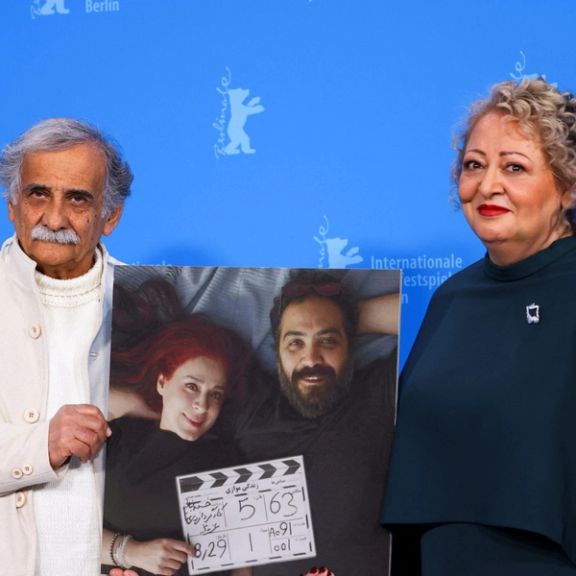
Two Iranian films have been awarded prizes at the 74th Berlin International Film Festival (Berlinale) with one of them secretly made focusing on the topic of hijab.
The movie "My Favorite Cake," crafted by Iranian directors Behtash Sanaeeha and Maryam Moqadam, has been honored with the prestigious International Federation of Film Critics (FIPRESCI) award.
Despite encountering travel restrictions, Moqadam and Sanaeeha's second collaboration at the Berlinale captivated audiences and critics alike, earning recognition for its portrayal of contemporary Iranian life and defiance of mandatory hijab.
It depicts the everyday lives of Iranians free from governmental censorship, portraying scenes that were previously considered cinematic taboos, such as men and women shaking hands, touching, embracing, and consuming wine.
In a statement issued on Saturday, Moqadam and Sanaeeha expressed their gratitude for the accolade, lamenting their absence during the ceremony due to travel constraints. Actress Leili Farhadpour, representing the filmmakers, delivered their sentiments during the FIPRESCI award presentation.
Simultaneously, "Shahid," directed by Narges Kalhor, claimed the Forum section award, marking a historic moment as the first Iranian film to win the distinction since its introduction in 1986. "Shahid" delves into dark comedy, drawing from Kalhor's personal narrative as she confronts bureaucratic hurdles in Germany while seeking to shed the title "Shahid" from her family name.
Exploring themes of women's rights within a patriarchal religious society, both "My Favorite Cake" and "Shahid" illuminate the complexities of Iranian existence, resonating with international audiences at the Berlin International Film Festival.
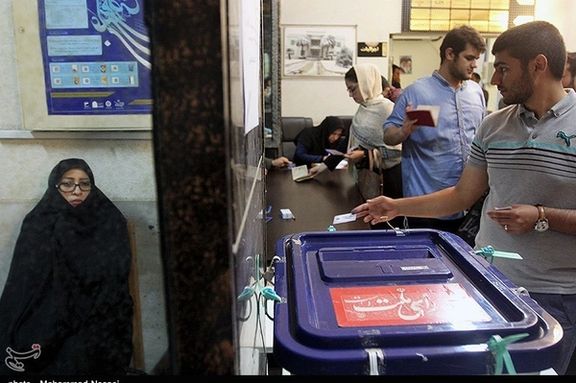
As the March 1 elections for the parliament and the Assembly of Experts draw near, Iranian officials are employing various arguments to persuade the hesitant electorate not to abstain from voting.
“All people, with any [political] inclination and belief, should enthusiastically participate in the elections," the Friday Imam of Yazd, the capital of a province of the same name in eastern Iran, told his congregation Friday.
Naser Mohammadi resorted to the argument that refusing to vote plays into the hands of "the enemy." He urged people to cast their ballots as a means of thwarting the plans of adversaries.
Other officials, such as Reza Deylami, the cultural deputy of the Islamic Propaganda Organization, have echoed similar sentiments, asserting that Iranian participation in the elections will serve as a blow to "the enemies" – referring to the United States, Western countries, and Israel.
"The enemies should await to be slapped in the face by the Iranian nation at ballot boxes,” he said. “We will avenge the blood of the martyrs of Kerman [bombing], Ghasem Soleimani, and the Resistance Front (Iran's allies in the region) at the ballot box," he added.
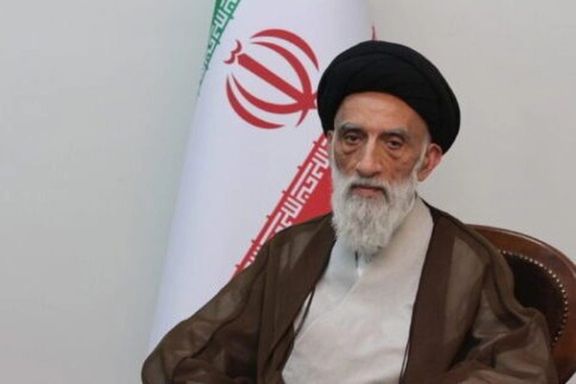
As in every election and following the decree of Supreme Leader Ali Khamenei other regime officials such as Mostafa Mousavi-Esfahani, a member of the Assembly of Experts, insist that voting is a religious duty and the wish of those who sacrificed their lives for the country.
Despite differing political affiliations, officials and regime supporters have converged on the belief that voter turnout, rather than individual candidate selection, holds paramount importance in the elections. They openly admit that it is the regime’s legitimacy which is at stake.
Recently, Supreme Leader Ali Khamenei once again appealed to the electorate to vote for the candidates the system has approved and claimed that the United States and other “enemies” desire a low turnout.
This apprehension regarding low voter turnout stems from the regime's longstanding assertion that high participation validates its legitimacy and signifies victory over external adversaries.
Candidates in the upcoming elections have undergone extensive vetting by various security bodies, including the Revolutionary Guards (IRGC) intelligence organization and the Ministry of Intelligence. This process ensures the exclusion of political rivals from the competition.
Differences among candidates are quite minimal. Many former insiders, not only reformists but also most moderate conservatives, have been barred from running.
A recent survey by the Netherlands-based Gamaan institute found that nearly three quarter of all eligible voters who responded to its poll had decided not to vote including 39 percent of those who had voted in the parliamentary elections of 2020.
The same survey found that if a referendum was held, nearly 75 percent of its respondents would say no to the Islamic Republic.
Apathy among the general population seems to be so deep that many social media users with strong anti-regime sentiments apparently see no need to try to convince others to stay away from the ballots.
Hardliner regime supporters, however, seem to be very persistent in their efforts to convince people that their vote matters. “Those we prefer will be elected if you don’t vote. So, whose loss will it be, mine or yours?” a regime supporter tweeted with the hashtags “national power” and “people’s choice”.
For the first time in Iranian elections, voters’ birth certificates will not be stamped, and they can use other forms of identity documents such as passports to vote.
Head of Iran's civil registry organization, Hashem Kargar, who is a member of the election taskforce confirmed Friday that the practice of stamping birth certificates has been scraped but claimed that the organization has provided electronic data to the interior ministry to authenticate voters’ identity papers at the ballots.
Some social media users allege that accepting other forms of identity documents and scrapping the practice of stamping birth certificates without appropriate electronic infrastructures is meant to allow regime supporters to cast multiple votes.
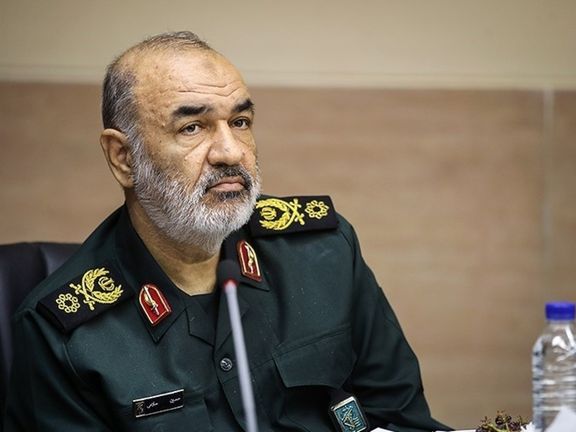
Iran's IRGC Chief-Commander Hossein Salami asserts that only the eradication of Israel from the world's political map can guarantee the security of Muslims and Palestinians.
Salami's Saturday remarks come amidst escalating tensions in the Middle East as the war between Hamas and Israel continues.
"Enemies seek to impose their will upon us, expecting our people to act politically according to their desires… I tell them that in the future war, we will showcase the most glorious political saga as a strong fist," Salami declared, emphasizing Iran's commitment to supporting Palestinian militant groups.
Salami is known for his rhetoric against Israel and the United States, although the clerical regime in Tehran has avoided direct involvement in conflict.
The recent assault on Israel by Hamas, which resulted in the loss of more than 1,000 civilian lives, has further fueled Iran's rhetoric against Israel. However, Iran's threats have not outlined a clear detailed plan of action.
Iran-allied militias have already initiated attacks on US troops' bases in Iraq and Syria, extending the conflict beyond Israeli borders. The Iranian regime openly signaled its support for Hamas, providing financial and arms support, with Iran's ruler Ali Khamenei and President Ebrahim Raisi praising the recent onslaught.
Despite US preference for diplomatic dialogue, President Joe Biden's stance on the conflict with Iran has faced criticism for its perceived leniency. Iran's militias have retaliated against US facilities, resulting in multiple deaths, prompting Biden to authorize strikes on targets associated with Iran's IRGC in Iraq and Syria and Yemen in response to recent provocations.

Over 800 inmates at Urmia Central Prison in northwestern Iran have called for the removal of the prison's chief, citing a rise in suicide incidents attributed to mistreatment.
Reports from human rights sources reveal that prisoners have raised concerns in an open letter over abuse inflicted upon inmates and their families by the prison chief Peyman Khanzadeh and other guards.
The letter notably references the recent suicide of a prisoner who was condemned to amputation of limbs according to Islamic Sharia laws.
Despite calls from international bodies such as the United Nations and rights groups urging the cessation of amputation sentences and their execution in Iran, the issuance and execution of such punishments persist in the Islamic Republic, including whipping, finger amputation, stoning, and amputation of hands and feet.
"Amir Shahbazi, having been pardoned by all his complainants, ended his life through suicide with no prospects of freedom," added the letter.
According to the report, Shahbazi had previously communicated to his family in a letter that both the prison chief and a ward officer were factors leading to his decision to take his own life.
Prisoners further detail the dire conditions within solitary confinement cells describing them as "appalling" and "horrendous." They highlight that numerous inmates in these areas have taken their own lives in recent months, resulting in grieving families receiving the bodies of their loved ones every few months.
Human rights activists and organizations continue to voice concerns over the torture and mistreatment prevalent in Iran's prison system. They emphasize that such cases are particularly severe and widespread in facilities located outside the capital city, Tehran.

Iranian-American dissident activist Masih Alinejad emphasized to Iran International that Western leaders harbor no uncertainty about the necessity of overthrowing the Iranian regime.
"I challenged the foreign ministers of Western countries for not listing Iran's Revolutionary Guard (IRGC) as a terrorist organization after I came to know that the issue of the Islamic Republic and its evil deeds was removed from the agenda of the Munich Security Conference," she remarked in a television interview. Alinejad participated in the conference and spoke with several European politicians.
According to the dissident, she told the representatives of Western governments that “unless you treat [Supreme Leader] Ali Khamenei and the IRGC the same way you treat Vladimir Putin, you cannot even discuss ending the war in Ukraine.”
Though Western countries have no doubt that the Iranian regime is the main instigator of war in the region and has been involved in more than 500 assassinations on their soils, they say in private meetings that in the case of designating the IRGC as a terrorist organization, it may “carry out more terrorist operations,” Alinejad went on to say.
The IRGC was initially established as a custodian of Iran's 1979 revolution's ideological principles. Over time, it has transformed itself into a significant force, gaining control in military, political, and economic aspects within the country. It was banned in the United States in 2019.
Over the past years and particularly, after massive protests in Iran triggered by the death in morality-police custody of Mahsa Amini in 2022, many Iranian political and civil activists have urged the international community to adopt a tougher stance towards the Islamic Republic and designate the IRGC.
In another part of her interview with Iran International, Alinejad stressed that “Westerners want to make sure that there is a functioning opposition in Iran that can hold free elections and prevent any chaos and insecurity after the overthrow of the Islamic Republic.”
The New York-based political activist further added that Iran’s nationwide uprising in 2022 and the October 7 attack on Israel by Tehran’s proxy Hamas have left Western leaders with no doubt regarding the necessity of the overthrow of the regime.
Though everyone knows that the Islamic Republic will collapse, they don’t know who to negotiate with because Iran abounds with multiple viewpoints and the West is worried that Iran may end up in the same political situation as that of Iraq or Syria after the current regime collapses, Alinejad noted.
Referring to the failure of the Iranian opposition groups to work together, she stated: “Not only Westerners, but also the Iranian people are asking how foreign governments can trust an opposition which is disjointed like scattered islands.”
The face-to-face meetings of the opposition forces with Western authorities will be effective in reflecting the voices of the Iranian people, but these meetings won’t be conducive to desired results if it is not proven to the international community that the opposition can hold free elections after the regime collapses, the dissident warned.
Alinjead has been one of the most vocal critics of the Iranian regime. Over the past years, she has been the target of several schemes by Tehran’s agents who planned to kidnap or assassinate her. US law enforcement foiled these conspiracies.
In 2021, US prosecutors indicted four individuals suspected of being Iranian intelligence operatives, alleging their involvement in a plot to abduct Alinejad.
In January 2023, the US also charged three men named Rafat Amirov, Polad Omarov and Khalid Mehdiyev with murder-for-hire and money laundering for their role in the thwarted Tehran-backed plot to assassinate Alinejad.